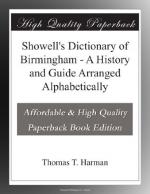Slater.—Hutton says that an apothecary named Slater made himself Rector of St. Martin’s during the days of the Commonwealth, and that when the authorities came to turn him out he hid himself in a dark corner. This is the individual named in Houghton’s “History of Religion in England” as being brought before the Court of Arches charged with having forged his letters of orders, with preaching among the Quakers, railing in the pulpit at the parishioners, swearing, gambling, and other more scandalous offences.
Scholefield.—The pastor of the Old Meeting Congregation in 1787 was named Scholefield, and he was the first to properly organise Sunday Schools in connection with Dissenting places of worship.
Robert Taylor.—The horrible title of “The Devil’s Chaplain” was given the Rev. Robert Taylor, B.A., who in 1819-20 was for short periods curate at Yardley and at St. Paul’s in this town. He had been educated for the Church, and matriculated well, but adopted such Deistical opinions that he was ultimately expelled the Church, and more than once after leaving here was imprisoned for blasphemy.
Charles Vince.—Charles Vince was the son of a carpenter, and was a native of Surrey, being born at Farnham in 1823. For some years after reaching manhood Mr. Vince was a Chartist lecturer, but was chosen minister of Mount Zion Chapel in 1851, and remained with us till Oct. 22, 1874, when he was removed to the world above. His death was a loss to the whole community, among whom he had none but friends.
John Webb.—The Rev. John Webb, who about 1802 was appointed Lecturer at St. Martin’s and Minister of St. Bartholomew’s was an antiquarian scholar of some celebrity; but was specially valued here (though his stay was not long) on account of his friendship with Mendelssohn and Neukomm, and for the valued services he rendered at several Festivals. He wrote the English adaptation of Winter’s “Timoteo,” or “Triumph of Gideon,” performed at the Festival of 1823, and other effective pieces before and after that date, interesting himself in the success of the Triennials for many years. He died February 18, 1869, in Herefordshire.
William Wollaston.—That eminent English divine, the Rev. William Wollaston, who was born in the neighbouring county of Stafford, in 1659, was for several years assistant, and afterwards head master at our Free Grammar School, but, coming into a rich inheritance, retired. He died in 1724.
And so the list might go on, with such names as the Rev. Charles Curtis, of St. Martin’s (1784) the Rev. E. Burn, of St. Mary’s (1818), the Rev. John Cook, of St. Bartholomew’s (1820), the Rev. W.F. Hook, of Moseley (1822), afterwards Dean of Christchurch; Dr. Outram, of St. Philip’s (who died in 1821); Rann Kennedy, of St. Paul’s; G.S. Bull, of St. Thomas’s; with I. C. Barratt, of St Mary’s, and many other clergymen and ministers, who have departed in these later years.




